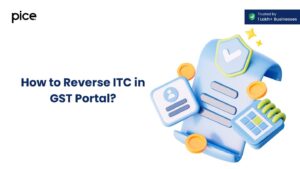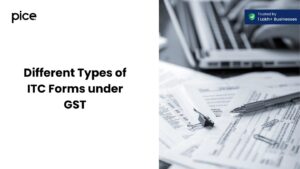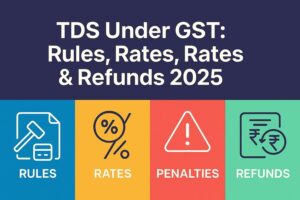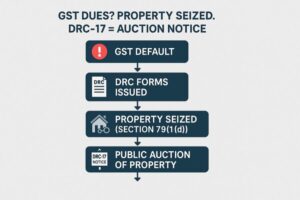Taxable Person Under GST
- 4 Nov 24
- 12 mins

Taxable Person Under GST
Key Takeaways
- A taxable person under GST includes various entities like individuals, companies, and partnerships that engage in taxable activities and meet certain turnover criteria.
- GST registration is mandatory for businesses that exceed a specified turnover or meet special criteria, including casual and non-resident taxable persons.
- Casual taxable persons benefit from operational flexibility, allowing short-term projects and seasonal business without permanent registration in every state.
- Responsibilities for GST-registered entities include compliance with tax laws, maintaining accurate records, and filing periodic returns.
- Casual taxable persons face limitations like temporary registration validity and operational challenges, contrasting with the stability of regular taxpayers.
Any taxpayer registered under GST is referred to as a taxable person. However, there can be numerous entities tagged under the title of 'taxable person'. If you are curious to know about who a taxable person under GST is, this blog is for you. Read on to learn in detail about the eligibility, benefits, responsibilities, registration process and more about GST-registered taxpayers.
GST Definition of Taxable Person
As per Section 2(73) of the GST Act, a taxable 'person’ is referred to the following entities:
- A Hindu Undivided Family
- A Company
- An Individual
- A Partnership Firm
- A Limited Liability Partnership
- An Association of Persons or a Body of Individuals, in India or outside India
- Society as defined under the Societies Act, 1860
- Trusts Artificial judicial person, who do not fall within any of the above categories
- Anybody corporate incorporated by or under the laws of a country outside India
- Any Corporation Established by or under any Central, State, or Provincial Act, or a Government Company
- A co-operative society registered under any cooperative society law
- A local authority
- Government
💡 If you want to pay your GST with Credit Card, then download Pice Business Payment App. Pice is the one stop app for all paying all your business expenses.
Who Needs GST Registration?

As stated in Chapter 6 of the GST Act, the following are certain categories of entities that must register themselves under GST:
- Ventures with Aggregate Turnover Criteria
Businesses making a taxable aggregate annual turnover above the threshold limits of ₹20 lakhs in a financial year should be mandatorily registered under the GST Act. However, under special category states, the minimum limit is ₹10 lakhs to be eligible under tax regulations.
- Special Category States Under GST
States that have been designated as special category states include Nagaland, Assam, Jammu & Kashmir, Himachal Pradesh, Manipur, Arunachal Pradesh, Meghalaya, Uttarakhand, Mizoram, Tripura, and Sikkim. Usually, the National Development Council is in charge of designating a state as a special category state. Some of the factors popularly taken into consideration include low population density, hilly and difficult terrain, strategic location along borders, a sizeable share of tribal population, non-viable nature of state finances, and economic and infrastructure backwardness.
- Mandatory GST Registration Criteria
There are several taxpayers who do not qualify under the aggregate turnover criteria but are eligible for GST registration as per the mandatory registration criteria and need to abide by the tax regulations. These criteria include:
- Casual Taxable Persons Making Taxable Supply
The term ‘Casual taxable person’ refers to those individuals who have no fixed business place and occasionally take up the supply of goods and services. An example of this includes firework shops that are set up during Diwali or an event management business.
- Persons Making Any Inter-State Taxable Supply
Individuals who are involved in the supply of goods from one state to the other need to register themselves under GST.
- Persons Required to Pay Tax Under Reverse Charge
The majority of the time, the supplier is liable to pay the taxes under GST. Nonetheless, sometimes the recipient is also responsible for the payment of tax liability. Such transactions are known as reverse charges and any person liable to pay them must register themselves under GST.
- Non-Resident Taxable Persons Making Taxable Supply
A person with no principal place of business in India and supplying goods or services within the country is termed a non-resident taxable person. Such persons should mandatorily register under GST, irrespective of their aggregate turnover.
- Persons Who Make Taxable Supply of Goods or Services on Behalf of Other Persons
People such as brokers, agents, dealers, etc. who make taxable supply of goods and services on behalf of their customers also need to register under GST.
- Persons Required to Deduct Tax Under GST
As per Section 51 of the GST Act, the government formed an agency to deduct 1% of taxes when a person supplies goods or services worth more than ₹2.5 lakhs. Such agencies should register themselves under GST as ‘deductors’.
- Input Service Distributor
A supplier of goods and services who receives tax invoices for the receipt of input services and generates the necessary invoices is referred to as an Input Service Distributor. They, too, must register themselves under GST.
- Electronic Commerce Operator
Electronic commerce involves the supply of digital products and an Electronic Commerce Operator is a person who owns or operates such businesses. Even they should mandatorily register under GST and pay their tax liability.
- Persons Who Supply Goods or Services Through Electronic Commerce Operators
People who are associated with the supply of their goods and services through electronic commerce operators have to mandatorily collect tax for functioning on behalf of suppliers. Thus, such people will also have to pay GST and register themselves accordingly.
- Persons Supplying OIDAR (Online Information and Database Access or Retrieval Services)
If a person is involved in the supply of OIDAR from any place outside India to any person residing in this country, they must register under GST.
- Persons Having Service Tax or VAT or Central Excise Registration
All people who were previously obligated to pay taxes under service tax VAT or central excise must register under GST.
- Transferee or Successor of a Business
A person who is the success of a venture that is presently headed by a GST-registered person must register under GST immediately upon their succession.
Responsibilities of Taxable Persons
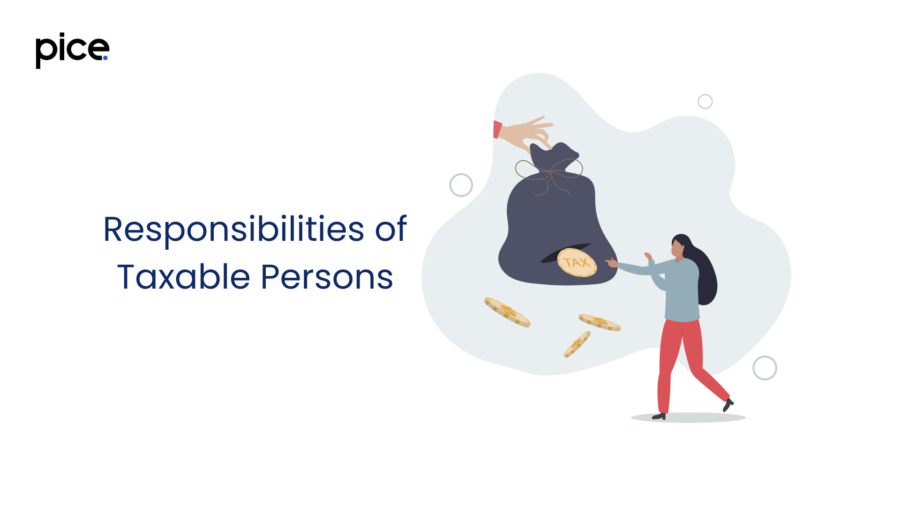
Being a GST-registered person, you will have to bear certain responsibilities such as compliance with rules and maintaining the necessary paperwork. Upon doing so, they can reap advantages like enhanced credibility of the venture, new opportunities for growing business and availability of Input Tax Credit, minimising overall taxes.
Registration Process
Following is the step-by-step process of registration application for a casual taxpayer:
- Online application: Navigate to the GST portal and fill out Form GST REG-01, Part B. Enter all the basic details and business information accurately when filling out the registration application.
- Upload documents: After filling out the GST registration form, move on to upload the required documents on the portal.
- Advance tax payment: If possible, you can estimate and calculate your GST liabilities in advance when filling out the form. Once done, it will be credited to your temporary GST account.
- Extension and validity of registration: In general, the validity period of registration is 90 days. However, you can request for its extension by submitting Form GST REG-11, before the expiration date of registration.
- Registration completion: After uploading the necessary documents and their verification, the registration process is completed. After that, you will receive the CTP registration certificate for GST along with a unique GSTIN within 3 working days.
- Filling out Final Returns: After receiving the GSTIN and certificate of registration, file Form GSTR-10, as final annual returns and complete all your GST obligations.
Benefits of Being a Casual Taxable Person
There are several benefits that you can reap upon registering as a casual taxable person. These advantages include:
- Flexibility of operations: One of the major benefits that taxpayers can receive is operational flexibility due to the lack of a principal place of business in India. Ventures with GST registration can participate in various trade fairs, short-term projects, exhibitions and so on.
- Additional tax benefits: Businesses as casual taxpayers can claim Input Tax Credits on goods and services using temporary registration. This minimises operational costs within the state as well as ensures simplified tax compliance during the registration period.
Obligations and Responsibilities
Along with the benefits, there are certain responsibilities that casual taxpayers need to bear. These obligations include:
- Mandatory compliance: It is a must for casual taxpayers to strictly adhere to the GST laws. These include advance tax payments, registration of all taxable activities, periodic filing of GST liability and so on, streamlining business activity.
- Maintenance of records: All casual taxpayers must keep thorough records of sales and purchases, documentation of all tax payments, annual turnover, inventory used for business purposes and other business details when filing temporary registration. Proper records facilitate simpler compliance, streamlined reporting and accurate calculation and claiming of Input Tax Credits.
Limitations and Challenges
There are several limitations that come with registration under the GST liability framework, which casual taxpayers must be aware of. These include:
- Duration of validity: Typically, the GST registration of a casual taxable person is valid for up to 90 days. However, they have the option to extend their registration to up to an additional 90 days before expiry. This restriction on the validity period of GST registration forbids taxable persons to undertake long-term projects.
- Perception of the market: Casual taxpayers have a notable influence on how other businesses and consumers view their venture. Many people do not consider CTPs as stable and reliable as businesses with permanent GST registration.
- Operational constraints: There is a continuous operational challenge that CTPs face due to a lack of permanent business establishment and the presence of temporary registration. Some of the problems include establishing a stable customer base, complications in setting up temporary operations, logistical challenges in managing supplies and inventories and so on.
Comparison with Regular Taxpayers
Often, there is confusion between a casual taxable person and a regular taxpayer. To mitigate it, the following is a table highlighting the comparison between them:
| Criteria | Casual Taxable Person (CTP) | Regular Taxpayer |
| Tax Payments | Options to pay taxes in advance are present based on the turnover estimated during the period. | Payments of taxes are based on the actual business transactions conducted during the tax period. |
| Registration Requirement | It is essential for taking on corporate projects without having a permanent base. | It is essential for conducting business operations with a permanent office. |
| Return Filing | Usually, the returns are filed only for the registration period, mostly as monthly returns. | Regular filing of GST is done, usually on a monthly or quarterly basis for inter-state supply and intra-state supply. |
| Input Tax Credit | They are eligible to claim ITC on transactions of goods and services during the active registration period. | During the registration active period, they can claim ITC on goods and services transactions continuously. |
| Duration of Registration | The registration is temporary and is valid for 90 days. Business owners can also go for an extended period of registration by 90 more days. | The registration is permanent and is valid as long as the business is operational unless cancelled. |
| Compliance Burden | It is somewhat higher than regular taxpayers since they will have to estimate taxes and comply with them within a short duration. | Steady compliance is applicable for filing audits as they can be as the tax amount can be planned. |
| Audit and Scrutiny | It is less since the duration is short and the registration nature is temporary. | Undergoes regular audits alongside strict, regular and frequent scrutiny. |
| Flexibility | The businesses are flexible and operate in a multistate without permanent GST registration. | Registration and compliance are essential in every state, owing to the principal place of business in India. |
Conclusion
A taxable person under GST is sure to enjoy several benefits, be it casual or regular. However, it is equally important for them to abide by all the rules and stay compliant with the GST laws if they want to maximise their advantages of GST registration.
FAQs
Who is taxable under GST?
Any individual, company, or entity that supplies goods or services within India and meets the GST registration criteria is considered taxable under GST. This includes businesses with an annual turnover above the specified threshold and those engaged in inter-state supplies.
 By
By 





